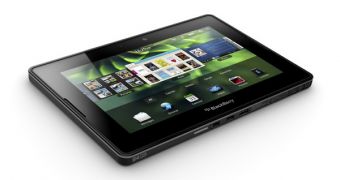Canadian mobile phone maker Research In Motion has been rumored
to see slow sales of its new BlackBerry PlayBook tablet PC at some retailers, and the company stepped up and provided a response to those claims.
According to it, these sales figures would not be consistent with the feedback the company received from its main retail partners.
According to the said report, at a certain retailer, unnamed, RIM's PlayBook missed internal sales figures by as much as 90 percent, which was more than disappointing.
Moreover, the retailer noted that the PlayBook registered rather high return rates, something also unexpected.
But RIM believes that things are otherwise, at least this is what the company said in a statement to BGR: The source of the reported comment is anonymous and unknown to RIM, but the comment is certainly inconsistent with the positive feedback we have received from our main retail partners.
As previously indicated, RIM will provide a business update on BlackBerry PlayBook results on June 16. Moreover, the mobile phone maker offered a statement coming from Best Buy, is which this leading retailer says that sales have been great: Best Buy has had great success selling BlackBerry smartphones in North America, so our sales expectations for the BlackBerry PlayBook were very high.
To date, we have far exceeded those expectations and we’re finding that customers are even more interested in purchasing once they’ve tested the PlayBook in the store. Previously, analysts suggested that the PlayBook would be able to sell over 6 million units during the first 12 months of availability, but they updated the forecast.
Now, RIM is believed to be able to sell only some 2 million units in the said time frame, as sales would fall far behind initial expectations, RBC Capital Markets Managing Director Mike Abramsky stated not too long ago.
One way or the other, RIM should provide more info on how things are moving along as soon as June 16th, about three weeks from now.
The PlayBook is RIM's first tablet PC, running under a specially designed OS, based on QNX, and packing a 7-inch touchscreen display, along with a dual-core application processor.

 14 DAY TRIAL //
14 DAY TRIAL //